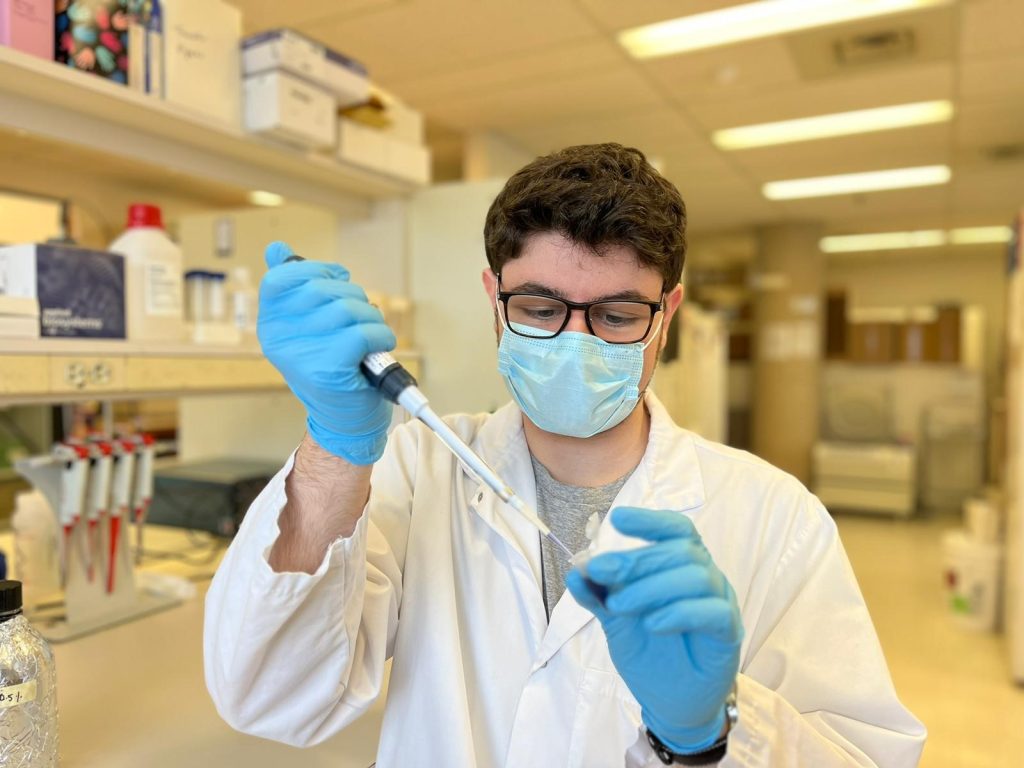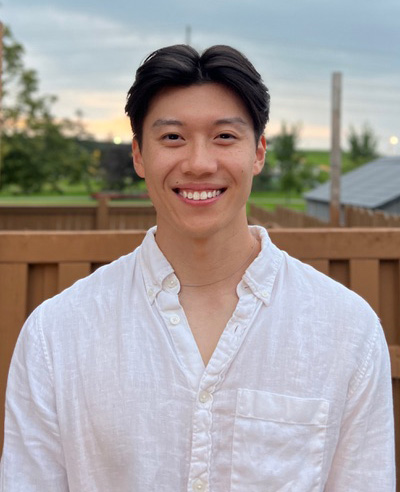- Please tell us a little bit about yourself.
My name is David Susman, and I am a first-year MSc student in the Department of Anatomy & Cell Biology at Western University. My supervisor is Dr. Alison Allan. I previously obtained an Honours BMsc in Medical Cell Biology from Western University. I am excited to be pursuing breast cancer-based research and hope to make a meaningful impact with my work.
- Why are you passionate about the work you are doing, and/or do you have a personal connection to breast cancer?
During my undergraduate studies, I became fascinated by cell biology, specifically cancer development. My interest in research grew after working closely with a clinical oncologist and seeing how research can be applied to help patients in a clinical setting. I have had many family and friends diagnosed with cancer, including breast cancer, so this topic is very personal to me. I am passionate about contributing to a field that will help people overcome their battles with this disease.
- Why is the TBCRU Studentship Award important to you, and how does it advance your research?
I am grateful to receive a TBCRU Studentship Award through the generous support of Breast Cancer Canada and their donors. This award has granted me the opportunity to meet and work with like-minded cancer researchers. Additionally, I have had the opportunity to learn from well-established breast cancer scientists and apply their teachings to my project. This funding has directly supported my research and allowed me to pursue fascinating experiments that would not have been possible otherwise.
- In a few lines, please describe your research project, including the main objective and what problem(s) you hope to solve.
A major concern with breast cancer is that once it spreads (metastasizes), the disease becomes much harder to treat, resulting in patient deaths. Current evidence suggests that breast cancer can modify other organs in our body to improve its ability to spread. One way in which breast tumors do this is by communicating with healthy tissue through the release of tiny particles called extracellular vesicles (EVs), These EVs travel through the bloodstream to distant organs where cancer might spread to, such as the lung, liver, brain or bone. My research aims to understand how EVs from triple negative breast cancers can lead to metastasis-promoting changes in lung tissue that create a permissive environment for the development of lung metastasis.
- Have there been any changes to or any advancements in your research since your project began?
Yes, there have been some exciting changes in my project. Initially my work was designed to assess cell-wide protein changes in healthy lung cells treated with breast cancer EVs. However, we have since applied an innovative molecular approach that combines two scientific techniques called TMT (tandem mass tagging) and SILAC (stable isotope labeling with amino acids in cell culture). These tools will allow me to assess how and in what “language” breast cancer cells communicate with healthy lung tissue, as well as the active changes in the lung that create a supportive environment for metastasis.
- Have you had an opportunity to present (or publish) your research to your peers or the broader research community? Was it at a national or international meeting or in some other way?
As a first year MSc student, I have not yet had the opportunity to present my research. However, I hope to present at the upcoming Oncology Research and Education Day in London, Ontario in June 2023 and at a national or international conference later in the year.
- How will your research be applied in the clinic or in a real-world setting? How will patients benefit from the results of your work?
We do not yet fully understand the way in which breast cancer EVs modify the lung to promote breast cancer metastasis. My research has the potential to start to uncover this, and we expect that this study will help identify targets that can be exploited to prevent early changes that lead to the spread of breast cancer. In the future, this knowledge could lead to the development of new clinical strategies to improve breast cancer patient prognosis and reduce breast cancer-related deaths.
- Tell us about your involvement in the Breast Cancer Canada fundraising events (Raise More Challenge, One Billion Steps Challenge).
I was involved in the Raise More challenge in October 2022 for breast cancer awareness month. I look forward to participating in future fundraising events to support Breast Cancer Canada and spread awareness about our research.
- What are your hobbies? What are you currently reading, watching or listening to outside of the lab?
In the winter, I love downhill skiing and enjoy fishing in the summer. My favourite movies are Marvel films, and I loved the Game of Thrones series.




